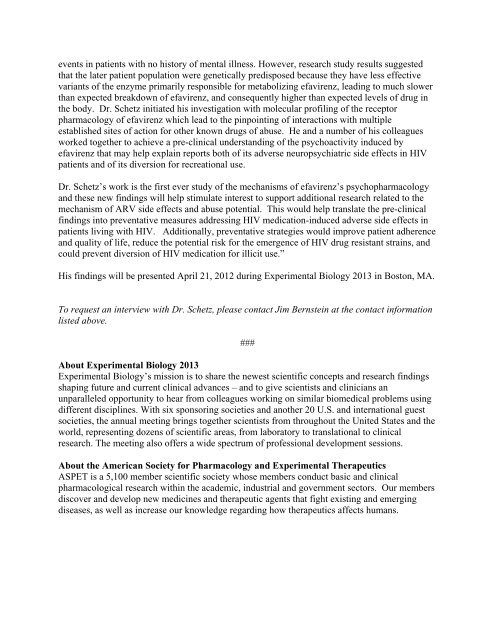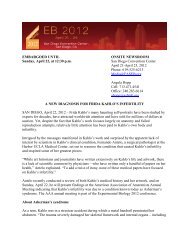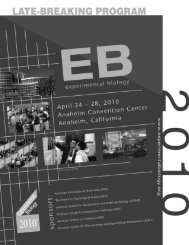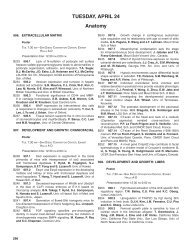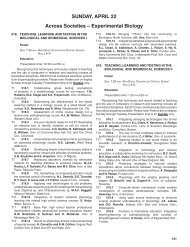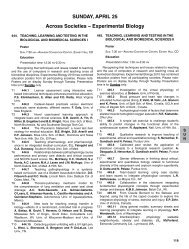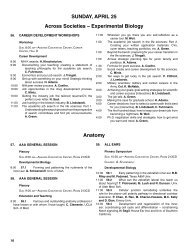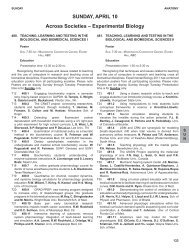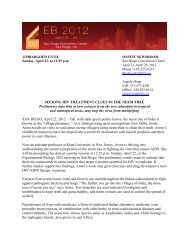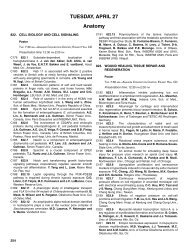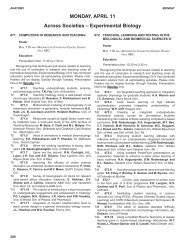Recreational Use of HIV Antiretroviral Drug Linked to its Psychoactivity
Recreational Use of HIV Antiretroviral Drug Linked to its Psychoactivity
Recreational Use of HIV Antiretroviral Drug Linked to its Psychoactivity
Create successful ePaper yourself
Turn your PDF publications into a flip-book with our unique Google optimized e-Paper software.
events in patients with no his<strong>to</strong>ry <strong>of</strong> mental illness. However, research study results suggestedthat the later patient population were genetically predisposed because they have less effectivevariants <strong>of</strong> the enzyme primarily responsible for metabolizing efavirenz, leading <strong>to</strong> much slowerthan expected breakdown <strong>of</strong> efavirenz, and consequently higher than expected levels <strong>of</strong> drug inthe body. Dr. Schetz initiated his investigation with molecular pr<strong>of</strong>iling <strong>of</strong> the recep<strong>to</strong>rpharmacology <strong>of</strong> efavirenz which lead <strong>to</strong> the pinpointing <strong>of</strong> interactions with multipleestablished sites <strong>of</strong> action for other known drugs <strong>of</strong> abuse. He and a number <strong>of</strong> his colleaguesworked <strong>to</strong>gether <strong>to</strong> achieve a pre-clinical understanding <strong>of</strong> the psychoactivity induced byefavirenz that may help explain reports both <strong>of</strong> <strong>its</strong> adverse neuropsychiatric side effects in <strong>HIV</strong>patients and <strong>of</strong> <strong>its</strong> diversion for recreational use.Dr. Schetz’s work is the first ever study <strong>of</strong> the mechanisms <strong>of</strong> efavirenz’s psychopharmacologyand these new findings will help stimulate interest <strong>to</strong> support additional research related <strong>to</strong> themechanism <strong>of</strong> ARV side effects and abuse potential. This would help translate the pre-clinicalfindings in<strong>to</strong> preventative measures addressing <strong>HIV</strong> medication-induced adverse side effects inpatients living with <strong>HIV</strong>. Additionally, preventative strategies would improve patient adherenceand quality <strong>of</strong> life, reduce the potential risk for the emergence <strong>of</strong> <strong>HIV</strong> drug resistant strains, andcould prevent diversion <strong>of</strong> <strong>HIV</strong> medication for illicit use.”His findings will be presented April 21, 2012 during Experimental Biology 2013 in Bos<strong>to</strong>n, MA.To request an interview with Dr. Schetz, please contact Jim Bernstein at the contact informationlisted above.###About Experimental Biology 2013Experimental Biology’s mission is <strong>to</strong> share the newest scientific concepts and research findingsshaping future and current clinical advances – and <strong>to</strong> give scientists and clinicians anunparalleled opportunity <strong>to</strong> hear from colleagues working on similar biomedical problems usingdifferent disciplines. With six sponsoring societies and another 20 U.S. and international guestsocieties, the annual meeting brings <strong>to</strong>gether scientists from throughout the United States and theworld, representing dozens <strong>of</strong> scientific areas, from labora<strong>to</strong>ry <strong>to</strong> translational <strong>to</strong> clinicalresearch. The meeting also <strong>of</strong>fers a wide spectrum <strong>of</strong> pr<strong>of</strong>essional development sessions.About the American Society for Pharmacology and Experimental TherapeuticsASPET is a 5,100 member scientific society whose members conduct basic and clinicalpharmacological research within the academic, industrial and government sec<strong>to</strong>rs. Our membersdiscover and develop new medicines and therapeutic agents that fight existing and emergingdiseases, as well as increase our knowledge regarding how therapeutics affects humans.


